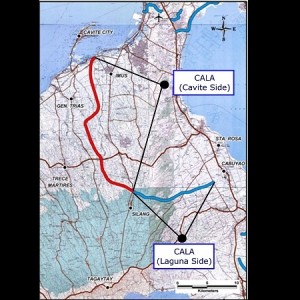To bypass problems, gov’t may build CALAx itself
MANILA, Philippines–The government is considering a new strategy to resolve the hotly contested $864-million Cavite-Laguna Expressway (CALAx) project: Remove the infrastructure project from the public-private partnership (PPP) program and build the tollroad itself.
Several well-placed industry sources said this option was raised during a recent Cabinet meeting and was seriously being considered as a viable option to break the CALAx deadlock.
By implementing the project itself, industry sources said, the government could avoid the image that it was favoring one party over another. For the proponents, this would be a losing proposition since it would mean taking private sector participation out of the project.
The problem started when the Office of the President issued an order to suspend the implementation of a resolution by the Department of Public Works and Highways (DPWH), which disqualified conglomerate San Miguel Corp. from the controversial bidding for CALAx.
The “stay” order from Malacañang prevented the DPWH from awarding the project to the Ayala-led Team Orion, which had submitted the highest bid after SMC’s unit, Optimal Infrastructure Development Inc. (OIDI) was disqualified.
Article continues after this advertisementTeam Orion offered to pay a premium of P11.659 billion to the government for the right to build the tollroad. But shortly before the opening of the qualified bids on June 13, SMC announced a premium offer of P20.1 billion.
Article continues after this advertisementOIDI was disqualified because the DPWH deemed that its bid security—an irrevocable standby letter of credit in the amount of P355 million issued by a universal or commercial bank—was “not in compliance” with the provisions set forth in the guidelines.
Industry sources said the Cabinet was split on the DPWH’s decision to disqualify SMC over a technicality issue. Another option was to declare a failure of bidding and conduct a new round of bidding. That option was put on the table to avoid legal challenge from either the SMC or Ayala groups.
In an interview, John Walker of Macquarie Capital (Hong Kong) Ltd. said that after so many false starts of the PPP program, it would be crucial for the Philippine government to follow its own rules. Otherwise, it would reverse the favorable economic momentum of the country.
“CALAx has become something of a sleeping giant. And my view on CALAx is, it is a big test to the credibility that has been built up. There is no doubt that it is a big test and that’s not just [my] view but the view in the region,” Walker said, as he warned the government against backtracking on issues that, in the past, had given the Philippines such a “bad reputation” among investors.
Walker said a rebidding would hurt confidence in the country “without any doubt,” creating the impression that the Philippines was back to its old ways.
“Processes are established for a reason. They are established to create a level, transparent playing field. The problem is, if you go outside those processes. You undermine the process entirely. I think the only thing to do is to follow the process to its logical proper conclusion,” he said.
Macquarie Group is among the groups, along with the state-owned Government Service Insurance System, Dutch pension asset manager Algemene Pensioen Groep NV and the Asian Development Bank, that created a $625-million infrastructure fund for the Philippines in 2012.
